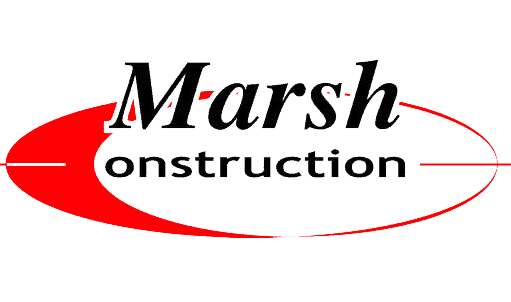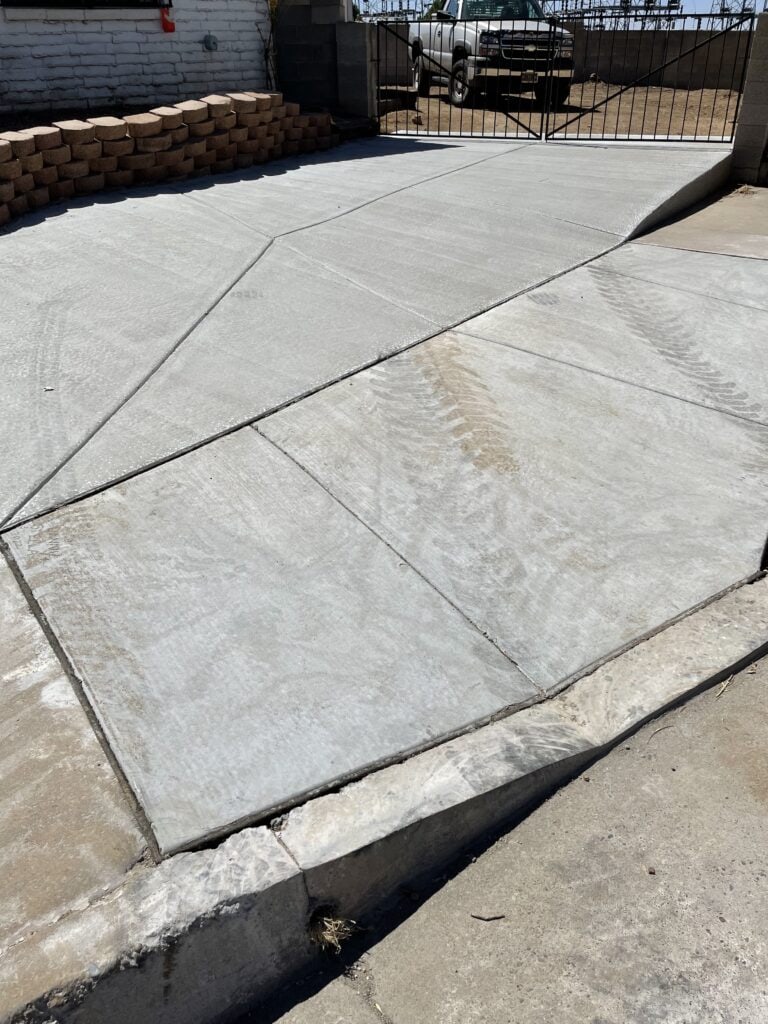When it comes to concrete driveway replacement or building a new driveway from scratch, one question stands out: What thickness and reinforcement do you need for durability and long-term performance? At Marsh Construction, we know this is a critical decision that impacts cost, functionality, and longevity. Whether you’re upgrading your home’s curb appeal or ensuring your driveway withstands heavy vehicles, getting this part right is essential.
Let’s dive into the details to help you make an informed choice.
Why Driveway Thickness and Reinforcement Matter
Your driveway’s thickness and reinforcement play a significant role in how well it holds up over time. If your driveway is too thin or lacks proper reinforcement, you’re likely to face cracking, sinking, or costly repairs sooner than expected.
Common Issues with Poor Construction
- Cracking: Thin driveways are more prone to cracking under pressure.
- Sinking: Inadequate preparation or thin slabs may lead to uneven surfaces.
- Reduced Lifespan: Driveways without proper reinforcement deteriorate quickly.
Building a driveway that lasts means starting with the right foundation and structure. Let’s explore what that entails.
Recommended Thickness for Concrete Driveways
The standard thickness for residential concrete driveways is 4 inches. However, depending on your specific needs, this may vary:
1. Light Residential Use
- Thickness: 4 inches.
- Ideal For: Driveways used for passenger vehicles and light loads.
- Benefits: Economical and sufficient for most homes.
2. Heavy-Duty Residential Use
- Thickness: 5 to 6 inches.
- Ideal For: Driveways that will handle trucks, RVs, or frequent heavy loads.
- Benefits: Adds durability and reduces cracking under pressure.
3. Commercial or Special Applications
- Thickness: 6 inches or more.
- Ideal For: Commercial properties or areas with high traffic.
- Benefits: Maximizes lifespan and strength.
Pro Tip: It’s always better to err on the side of thicker slabs for longevity, especially in climates with freeze-thaw cycles.
Choosing the Right Reinforcement
Reinforcement is key to preventing cracks and ensuring the driveway’s strength over time. Here are the most common options:
1. Wire Mesh
- What It Is: A grid of steel wires embedded in the concrete.
- Benefits: Minimizes surface cracking and improves tensile strength.
- Ideal For: Light and medium-use driveways.
2. Rebar (Reinforcing Steel Bars)
- What It Is: Steel bars placed in a grid pattern within the concrete slab.
- Benefits: Provides superior strength and durability.
- Ideal For: Heavy-duty or commercial driveways.
3. Fiber Reinforcement
- What It Is: Fibers mixed directly into the concrete.
- Benefits: Reduces shrinkage cracks and improves impact resistance.
- Ideal For: Driveways needing added strength without additional labor costs.
Pro Tip: Combining rebar with fiber reinforcement can create a highly durable driveway for challenging conditions.
Steps for Proper Concrete Driveway Installation
A well-installed driveway isn’t just about the materials—the process matters too. At Marsh Construction, we follow these key steps:
1. Site Preparation
- Remove old materials or debris.
- Compact the soil and create a level base.
- Add a gravel base (typically 4 to 8 inches).
2. Formwork and Reinforcement
- Install forms to shape the driveway.
- Lay wire mesh or rebar as needed.
3. Pouring and Finishing
- Pour concrete evenly and use tools to ensure proper thickness.
- Smooth the surface and add control joints to minimize cracking.
4. Curing and Sealing
- Allow the concrete to cure for 7 days.
- Apply a sealant to protect against moisture and stains.
How to Decide What’s Right for Your Driveway
Consider These Factors:
- Vehicle Weight: Will heavy vehicles regularly use the driveway?
- Climate: Freeze-thaw cycles may require thicker slabs.
- Budget: Reinforcements like rebar may increase upfront costs but save money on future repairs.
- Aesthetics: Choose finishes and sealants that complement your home.
Consulting with experienced driveway installation contractors like us ensures you get tailored advice and a driveway built to last.
Common Myths About Concrete Driveways
Myth #1: Thicker Concrete Always Means Stronger Driveways
While thickness contributes to strength, proper reinforcement and site preparation are equally important.
Myth #2: Cracks Mean Poor Quality
All concrete cracks eventually. The key is using control joints and reinforcements to manage and minimize cracking.
Myth #3: Sealants Are Optional
Sealants protect your investment from weather and stains. Skipping this step can shorten your driveway’s lifespan.
Thickness and Reinforcement Options
| Thickness | Reinforcement | Ideal Use |
| 4 inches | Wire Mesh | Light Residential |
| 5 inches | Rebar | Heavy Residential |
| 6+ inches | Rebar + Fiber | Commercial |
Ready to Build?
Contact Marsh Construction today for expert advice on your concrete driveway needs. Whether you need a concrete driveway replacement or a new installation, we’re here to help.
FAQs About Concrete Driveways
How Long Does a Concrete Driveway Last?
With proper construction and maintenance, a concrete driveway can last 20-30 years or more.
Can I Use Salt on My Driveway in Winter?
Yes, but use it sparingly as excessive salt can degrade the concrete over time.
Is Reinforcement Always Necessary?
For light-use driveways, reinforcement may not be critical. However, it’s always a good idea to ensure longevity.
How Soon Can I Drive on My New Concrete Driveway?
Wait at least 7 days before driving on your driveway to allow proper curing.
Building a concrete driveway that stands the test of time requires careful planning and expert execution. At Marsh Construction, we’re committed to helping you make informed choices that ensure lasting quality and curb appeal.
Explore Your Options
Check out our portfolio of past projects to see the quality and care we bring to every job.

